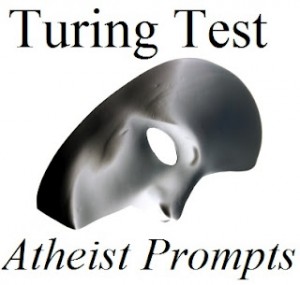This is the third entry in the Atheism round of the 2012 Ideological Turing Test for Religion. In this round, the honest answers of atheists are mixed in with Christians’ best efforts to talk like atheists. It’s your job to see if you can spot the difference. The voting link appears at the end of the entry, and you can look at all entries in this round here.
When (if ever) have you deferred to your philosophical or theological system over your intuitions?
My morality demands that I preserve life above all, and then to be honest. Intuitively, I desire to make people happy: my intuition is to apologize if I offend. However, my moral system demands that I be honest above being unoffensive, and therefore I will apologize precisely for hurting them, but actively point out that I do not believe I did wrong, although I’m open to them explaining why my actions were not consistent with my morals, and that I do not apologize for the action which hurt them. This leads to some awkward exchanges on occasion, but I believe my morality is of more importance than making others happy; I am the only one who is responsible for upholding my morality, and having a strong moral system is more important to me than being unoffensive.
Are there people whose opinions on morality you trust more than your own? How do you recognize them? How is trusting them different than trusting someone’s opinion on physics?
I cannot trust anyone else’s morality more than my own, because I am solely responsible for being a good person. If I do not have a self-consistent set of beliefs stemming from only a few axioms, how am I any better than a religious person with semi-inconsistent beliefs and a huge set of axioms, as most are? I can, however, read others’ arguments and find these arguments compelling, as long as they stem from the same axioms that I already hold. I can also read others arguments against mine, find that they are of the same axioms, and possibly adopt their argument and belief as my own also, because they’ve clearly demonstrated that their argument is better than my current argument.
This is similar, but much different, than trusting someone on physics: in physics, in most cases, given sufficient thought an experiment can be devised to determine the falsity of a hypothesis, while this is much less true of moral hypotheses. Furthermore, in the natural world, a grand unified theory is much less important than determining how the universe works in each small case: there is little reason to expect the universe to behave ‘nicely’, so there is less of an impetus for me to attempt to build up a grand unified set of axioms leading to all truths about physics than there is when I determine my morality.
Can you name any works of art (interpreted pretty broadly: books, music, plays, poetry, mathematical proofs, etc) which really capture the way you see life/fill you with a sense of awe and wonder? You can give a short explanation or just list a few pieces.
A Brief History of Time by Hawking gives such a beautiful history of how wonderful the natural universe is and how much it obeys simple laws and defies our imagination and is so much greater than any God could ever be; and how wonderful it is that it all arose out of the Big Bang. If, then, the natural world is so amazing, I should then strive to discover as much natural beauty as possible and destroy as little as possible, and this compels the requirement of having some morality, even without a God.
Click here to judge this entry, and, once you’ve voted, feel free to speculate and trade theories in the comments or look at other entries in this round.












